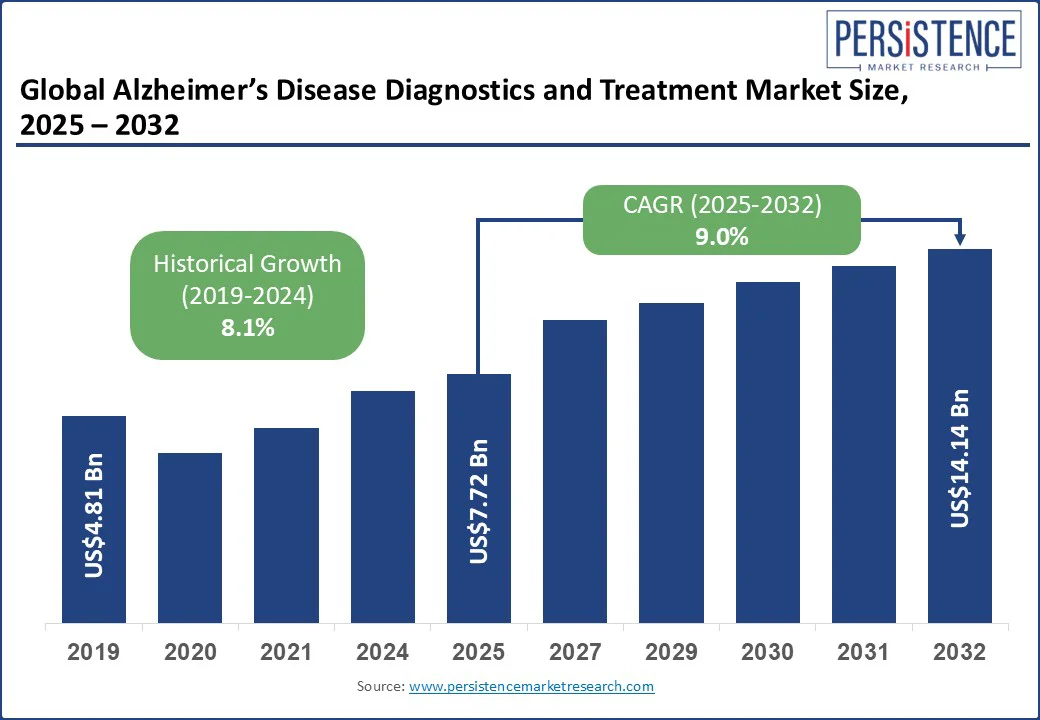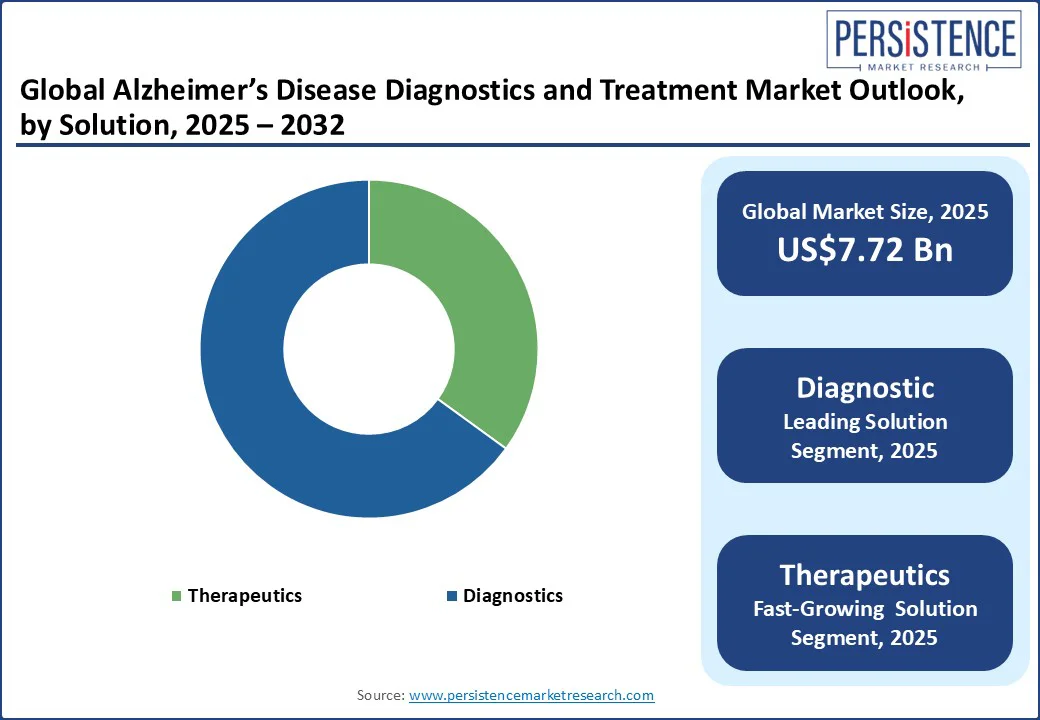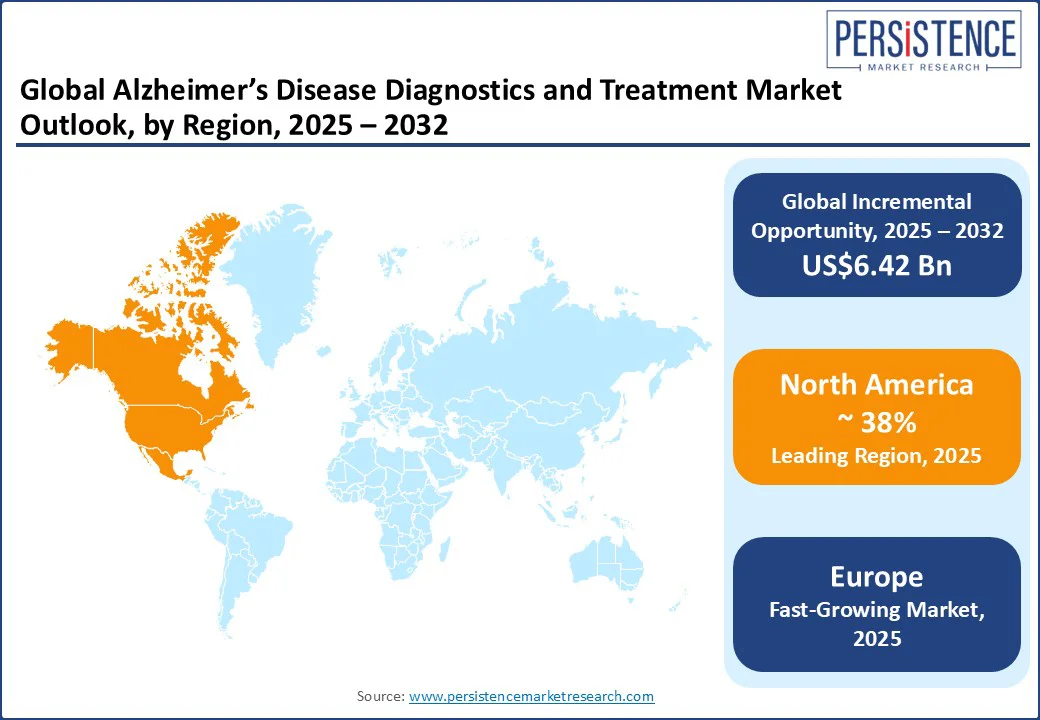ID: PMRREP33700| 201 Pages | 13 Aug 2025 | Format: PDF, Excel, PPT* | Healthcare

The global Alzheimer’s disease diagnostics and treatment market size is projected to rise from US$ 7.72 Bn in 2025 to US$ 14.14 Bn by 2032. It is anticipated to witness a CAGR of 9.0% during the forecast period from 2025 to 2032. Surge in dementia cases across the globe is estimated to boost the advancement in diagnostics and treatment for Alzheimer's disease in the forthcoming years.
The World Health Organization (WHO) stated in 2023 that around 10 million instances of dementia are recorded each year, affecting 55 million people globally. Alzheimer's is the most prevalent kind of dementia, accounting for 60% to 70% of cases.
Government and non-government organizations are investing heavily in diagnoses and treatments due to the increasing incidence of Alzheimer's disease worldwide, which might increase the demand for Alzheimer's disease treatments.

Key Industry Highlights
|
Global Market Attribute |
Key Insights |
|
Alzheimer’s Disease Diagnostics and Treatment Market Size (2025E) |
US$ 7.72 Bn |
|
Market Value Forecast (2032F) |
US$ 14.14 Bn |
|
Projected Growth (CAGR 2025 to 2032) |
9.0% |
|
Historical Market Growth (CAGR 2019 to 2024) |
8.1% |
Neuroimaging technologies, such as PET scans with amyloid tracers, are improving the accuracy of diagnostics and driving market growth. Companies are expanding their product offerings and launching new products due to ongoing research in the healthcare industry.
The Alzheimer’s disease diagnostics and treatment market is expected to grow in tandem with various healthcare initiatives, such as clinical trials and development in healthcare technology, during the forecast period.
The development of improved Alzheimer's treatments aims to target disrupted lipid pathways while reducing amyloid beta and tau proteins, further driving the growth of the Alzheimer's disease diagnostics and therapeutics market.
The high cost of diagnosing Alzheimer's disease poses a significant barrier to growth, as it incurs substantial economic and societal expenses for the healthcare system, individuals, families, and careers. Studies indicate that both the direct and indirect costs associated with Alzheimer’s disease-related healthcare are high, including expenses related to post-mortem brain tissue assessments using PET and CSF biomarkers, as well as innovative clinical criteria.
The cost of an accurate dementia diagnosis is calculated by dividing the total expenses of all investigative procedures by the number of confirmed diagnoses, utilizing unit costs for various diagnostic components. Additionally, the global prevalence of Alzheimer's disease is projected to rise dramatically due to the aging population, which will increase costs and hinder the growth of the Alzheimer's diagnostics and therapeutics market during the forecast period.
AI is transforming Alzheimer's research by analyzing MRI images and blood samples from patients worldwide. Convolutional neural networks, vision transformers, and federated learning are some of the cutting-edge methods being used by healthcare institutions to forecast the course of diseases and spot early warning indicators.
AI's role in personalized treatment and drug discovery is promising, as it can help determine the most effective treatments for individuals based on their unique genetic and clinical profiles. The consortium is now collaborating with pharmaceutical companies such as Biogen to develop innovative imaging techniques that make it easier to track Alzheimer's progression and test new drugs. The future of AI in Alzheimer's research is promising, with multimodal AI combining various types of medical data to improve diagnosis and treatment predictions.
Improvements in diagnostic technology are expected to enhance the accuracy and reliability of Alzheimer's diagnostic tests, leading to a market share of 65% for these diagnostics in 2025. This rise reflects an increasing demand for trustworthy diagnostic solutions. Companies such as Roche and Biogen are investing in innovative diagnostic methods, including cerebrospinal fluid biomarker tests, blood-based biomarker tests, computerized cognitive assessments, and brain imaging techniques. These advancements aim to improve early detection and treatment planning, thereby accelerating market expansion.
In addition, the senior population and the pressing need for efficient therapies that address the illness's underlying causes are driving the growth of the global Alzheimer's disease research sector, with disease-modifying treatments predicted to account for 35% of the market share in 2025. Eli Lilly, for instance, is expanding its production capabilities with a US$1.8 Bn investment in Ireland to meet the growing demand for its Alzheimer's drug. The rising prevalence of the disease, along with advancements in treatment options, propels the market growth in the forthcoming period.
Institutional sales are projected to dominate the Alzheimer's disease market in 2025, holding a market share of 68%. Hospitals, clinics, and long-term care facilities play a critical role in managing Alzheimer's due to the disease's complexity, requiring specialized diagnostic and therapeutic solutions.
The demand for institutional care is rising due to the increasing number of Alzheimer's patients, expected to reach 7.2 million in the U.S. by 2025. Healthcare providers are investing in advanced diagnostic tools and therapeutics, such as Eli Lilly’s donanemab and Biogen’s Leqembi, to enhance patient care.
Retail sales, accounting for 32% of the market in 2025, are experiencing rapid growth due to increased awareness and proactive health management. Consumers are turning to cognitive aids, caregiver support products, and digital health solutions for early intervention. Companies such as Neurotrack and Cogstate are expanding digital cognitive assessment tools, enabling early detection and at-home monitoring, driving further market expansion.

North America is estimated to hold 38% of the market share in 2025, due to its high incidence, robust healthcare infrastructure, and extensive research. The patient population in the U.S. and Canada contributes to the disease's prevalence. Researchers are expected to increase the clinical trials involving these patients to enhance research and development on drugs and therapies.
For instance, in 2024, market players conducted 48% of clinical trials exclusively in North America, 33% outside North America, and 20% across both North American and international locations. Overall, North America is expected to host approximately 67% of all clinical studies listed in the National Institutes of Health (NIH) database.
The region's advanced healthcare infrastructure, innovative solutions, access to advanced neuroimaging technologies, and well-equipped research facilities further contribute to its dominance in the market.
Alzheimer's disease is a growing problem in Europe, with around seven million people living with the disease, and its number is set to double by 2050. Healthcare initiatives such as the new IHI project AD-RIDDLE aim to revolutionize the detection, diagnosis, prevention, and treatment of Alzheimer's disease by delivering a modular and customizable toolbox platform.
Such medical platforms are envisioned to offer a digital community engagement portal, self-guided assessment tools, pathways for referral to appropriate healthcare services, screening and diagnostic tools, and a decision support toolkit for healthcare providers. The modular toolbox is set to be tested in different healthcare settings across six countries in Europe, such as the U.K. and Germany, and data from AD-RIDDLE will be hosted by the European Platform for Neurodegenerative Diseases (EPND).
European players are collaborating with various sectors, universities, healthcare providers, and regulatory bodies to develop a novel approach to Alzheimer's disease prevention, diagnosis, and management.
Asia Pacific is experiencing a transition from infectious diseases to chronic diseases, that impacts the balance between hospitals, public health, and primary care services. A significant concern is the rising prevalence of dementia, largely driven by lifestyle changes in the geriatric population. Emerging countries such as India and China are witnessing the most notable increases in dementia cases.
By 2050, it is projected that managing over 70 million people with dementia in the Asia Pacific is projected to place immense pressure on family, community, and healthcare resources. Supporting individuals with dementia requires a multidimensional approach that addresses their medical, cognitive, psychological, environmental, cultural, and social needs. The Lancet Commission has highlighted biological and lifestyle risk factors for dementia, such as social determinants, neuroimaging data, alcohol, smoking, and food, as contributing to rising dementia cases and the erosion of traditional community structures in the Asia Pacific.

The global Alzheimer’s disease diagnostics and treatment market is highly competitive, with manufacturers investing heavily in research and development to develop new diagnostic tools and treatments for Alzheimer's disease. They are diversifying their product offerings and expanding their offerings through acquisitions, collaborations, and clinical trials.
Prominent entities in the Alzheimer's disease diagnostics and treatment sector, such as Biogen, Eli Lilly, and Pfizer, use comprehensive strategies to maintain and augment their market dominance. They focus on developing disease-modifying therapies, such as Aducanumab, which targets fundamental etiological factors, and forming strategic alliances with healthcare providers and research institutions. Market players also focus on providing all-encompassing diagnostic solutions, such as digital health solutions, to enhance early detection and monitoring capabilities.
In 2025, the global Alzheimer's disease diagnostics and treatment market is projected to reach a value of US$7.72 Bn.
By 2032, the market is expected to grow significantly and reach approximately US$ 14.14 Bn.
Key trends include the increasing use of neuroimaging technologies like PET scans for early and accurate diagnosis, the development of monoclonal antibodies targeting amyloid and tau proteins, and the integration of AI in diagnostics and drug discovery.
The diagnostics segment is expected to lead the market, accounting for 65% of the global share in 2025.
The Alzheimer’s disease diagnostics and treatment market is projected to grow at a CAGR of 9.0% from 2025 to 2032.
Major players include Roche, Biogen, Eli Lilly, Athira Pharmaceuticals, and Cyclo Therapeutics
|
Report Attribute |
Details |
|
Historical Data/Actuals |
2019 - 2024 |
|
Forecast Period |
2025 - 2032 |
|
Units |
Value: US$ Bn |
|
Geographical Coverage |
|
|
Segmental Coverage |
|
|
Competitive Analysis |
|
|
Report Highlights |
|
|
Customization and Pricing |
Available upon request |
By Solution
By Sales Channel
By Region
Delivery Timelines
For more information on this report and its delivery timelines please get in touch with our sales team.
About Author